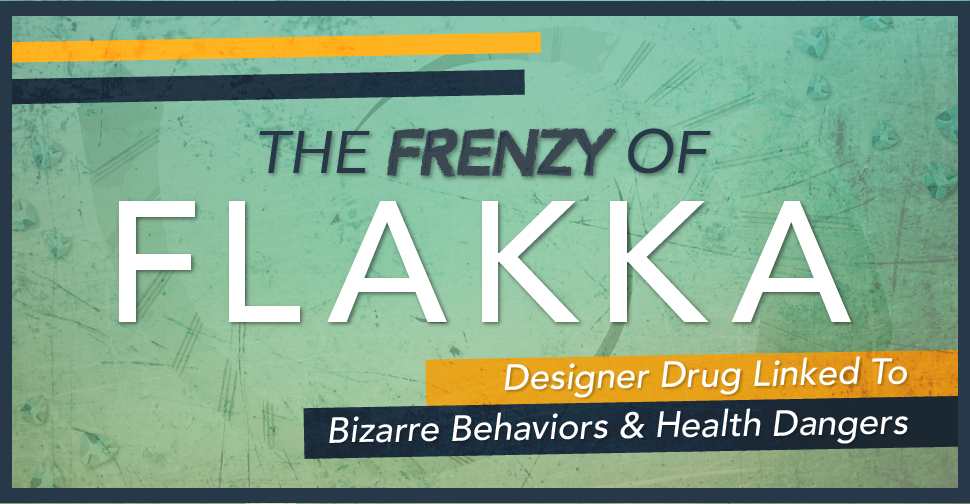Don’t be a human guinea pig.
That’s the warning from health officials about flakka, a wildly unpredictable street drug that can lead to kidney failure and extreme, life-threatening behaviors.
High on flakka, some users become violent and delusional with superhuman strength – convinced that others are trying to kill them. It’s a medical emergency known as “excited delirium,” a syndrome of flakka-induced hyperthermia, says Jim Hall, a drug abuse epidemiologist for the Center for Applied Research on Substance Use and Health Disparities at Nova Southeastern University in Fort Lauderdale, Florida.
“Excited delirium begins with an elevation of body temperature to 105 degrees or more. The person then rips off clothing and runs outdoors, convinced that he or she is being chased by people or imaginary wild beasts,” Hall says.
Southern Florida is the epicenter of flakka, a stimulant drug more potent than cocaine. At least 59 deaths in Broward County have been linked to the emerging synthetic drug between September 2014 and November 2015, Hall says.
Broward County hospitals are reporting as many as 15 to 20 flakka overdoses or cases of excited delirium each day since March 2015, he adds.
While flakka wreaks the most havoc in Florida, the street drug has also ravaged communities in Kentucky and impacted at least 11 other states, experts say.
Alarming Health Risks
Flakka’s effects on the body are dose-specific. “A little bit may get someone high, but a little bit more may trigger severe adverse effects,” Hall notes. These include heart problems (tachycardia), agitation and aggressiveness, psychosis, paranoia, and the potentially lethal “excited delirium.”
Fueled with adrenaline rush, paranoid flakka users often require multiple police officers to subdue them.
“Once restrained, medical attention is required immediately to avoid death,” Hall notes. “If the flakka user is lucky enough to survive, kidney failure from the hyperthermia may require dialysis treatment for years.”
Flakka – also known as “gravel” in some parts of the country – is the street name for alpha-PVP, a powerful illegal stimulant. Typically produced in a lab in China and sold online, the drug is cheap – $3 to $5 for a vial – and delivers a euphoric high when snorted, injected, swallowed or inhaled in e-cigarettes.
Alpha-PVP is similar in chemical makeup to the earlier generation of stimulants known as “bath salts.” These drugs contain synthetic chemicals related to cathinone, a naturally-occurring stimulant found in the Khat plant in Africa and the Middle East.
Playing “Russian Roulette”
Flakka and other man-made “designer drugs” have exploded in recent years. Nationwide, crime lab reports for synthetic cathinones increased from 29 total in 2009 to 13,479 in 2014, according to Joseph Moses, Supervisory Special Agent for the Drug Enforcement Administration (DEA).
“Currently, we’re seeing two to three new substances per month,” Moses says.
Along with flakka’s rise in popularity are synthetic cannabinoids, a designer drug designed to mimic the effects of marijuana. But like flakka, experts say these drugs can vary widely in potency and chemical composition.
Poison control centers received reports of 7,369 exposures to synthetic cannabinoids in 2015, through November. That’s a 100 percent increase over calls about the drugs for all of 2014, and a 176 percent increase over 2013, according to the American Association of Poison Control Centers. At least 15 deaths were related to synthetic cannabinoids from January to May, 2015 – triple the number of deaths in the same period last year, according to a report from the Centers for Disease Control and Prevention (CDC).
“If there’s one thing that we would tell parents, it’s to have that conversation with their kids. The consequences of not having that conversation can be absolutely tragic,” Moses says.
He emphasizes that designer drug users are playing “Russian Roulette” with their lives, since the chemical structure of each batch is unknown.
“These (synthetic drugs) are many times research chemicals produced in a lab. They aren’t tested, they were never meant for human consumption,” Moses says. “The guy who sells it may not know exactly what he’s selling.”
One Step Ahead of the Law
Flakka was placed on the DEA’s emergency list of controlled substances in March 2014, which means it’s a public health threat and sellers can be prosecuted. But like synthetic cannabinoids and other designer drugs, the chemists skirt the law by changing the formulation.
“What the producers and distributors are attempting to do is to play in the gray zone,” Moses says. “They tweak that chemical structure just enough to avoid being on the controlled substances list.”
A new website, http://dontbeaguineapig.com, sponsored by the Palm Beach County Substance Abuse Awareness Coalition, warns about ever-changing designer drugs:
“Many of these very dangerous substances are concocted in dirty garages, nasty basements, and dingy bedrooms in faraway countries. No one really knows what’s in those drugs and what they may do to you.
Do you really want to be experimenting with these drugs? You are smarter than that. Don’t be a guinea pig.”
Flakka users often report they are afraid of the drug – yet, they’re compelled to use it repeatedly, Hall says. “Its highly addictive properties are attributed to its molecular design, structured to block selected neurons in the brain.”
And the health dangers are not confined to flakka users, since the synthetic chemical alpha-PVP may be sold as cocaine or methamphetamine or even pre-rolled marijuana cigarettes, Hall notes.
“Various emerging synthetic drugs from factories in China or Mexico add to the uncertainty of exactly what is being sold as an illicit drug today,” he says. “Not only is flakka a guinea pig drug, but it helps make users of many different street drugs guinea pigs too.”
To get help for flakka exposure, call your local poison control center at 1-800-222-1222. Dial 911 immediately if someone stops breathing, collapses or has a seizure.
* * * * *


